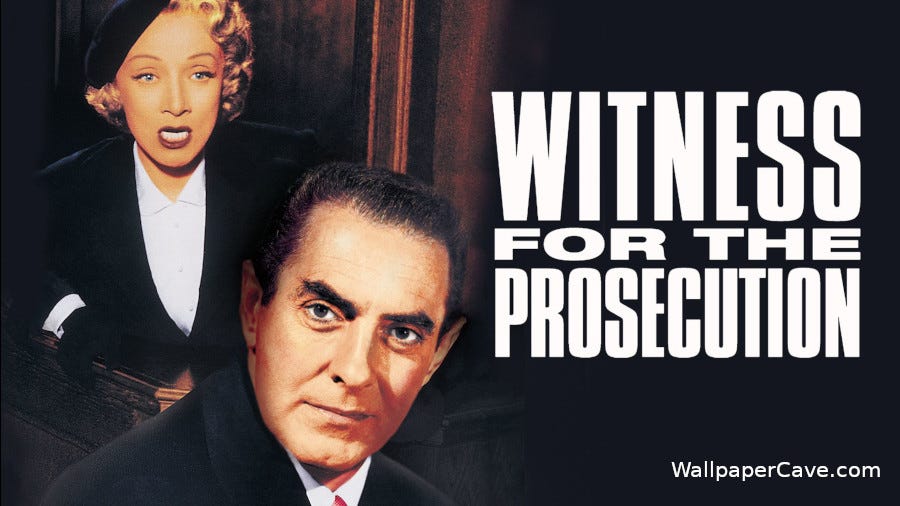Stream On! Let’s Twist Again—Billy Wilder’s ‘Witness for the Prosecution’
The management suggests that, for your friends who have not yet seen it, you will not divulge to anyone the secrets of the ending of ‘Witness for the Prosecution!’ And nor will I.
The original radio play of Witness for the Prosecution was written as a birthday gift to Queen Mary. That’s some lineage. The play itself had been adapted by Agatha Christie from her 1925 short story “Traitor's Hands.” Producers Arthur Hornblow and Edward Small bought the film rights to the play, which they adjusted to emphasize the character of the defense barrister. Billy Wilder (The Apartment) was signed to direct.
/Streaming /Amazon /🍅100% 🍿95% /Trailer /1957 /NR
“The management of this theater suggests that, for the greater entertainment of your friends who have not yet seen the picture, you will not divulge to anyone the secret of the ending of Witness for the Prosecution.”
—This was read out over the closing titles of the movie. Agatha Christie had written, as usual, a mind-boggling twist for her courtroom drama, and Billy Wilder contributed six additional twists for the multistage denouement. More climaxes than Charlie Daniel’s “The Devil Went Down to Georgia.” That Wilder didn’t exceed his brief is attested to by Agatha Christie’s claim that Witness was her own favorite film adaptation of her work.
The crisp black-and-white cinematography at first belies the fact that this, like most of Ms. Christie’s work, is a polite entertainment. It’s not going to pass up many chances at comedy, which is successfully integrated into the action—but the threat of danger is never far away.
And thus, after the pomp of a session of court opening, we immediately meet Senior barrister Sir Wilfrid Robarts (Charles Laughton, The Big Clock, Rembrandt) and his nurse/nemesis Miss Plimsoll (Elsa Lanchester, Laughton’s real-life wife: The Bride of Frankenstein, The Big Clock, Rembrandt). They are in the back of a cab, on their way to court, and playing it for laughs:
Miss Plimsoll: “Is there too much of a draft?” Fussing. “Shall I roll up your window?”
Sir Wilfred, huddled in a blanket, clutching a thermos: “Just roll up your mouth; you talk too much! If I’d known how much you talk, I wouldn’t have come out of my coma!”
Sir Robarts agrees to defend Leonard Vole (Tyrone Power, Jesse James et al. His character Vole, sequestered somewhere, watches “a ‘Jesse James’ movie”) over the objections of Robarts’ private nurse Miss Plimsoll, Sir Wilfrid's doctor having warned against taking on stressful criminal cases. She is sure that Sir Wilfrid could keel over “just like that.” Vole is accused of murdering Emily French, a wealthy, childless widow who had fallen in love with him and named him as the main beneficiary in her will.
When Sir Wilfrid speaks with Vole's German wife Christine (Marlene Dietrich), he finds her cold and self-possessed; she does provide an alibi, although it is not entirely convincing.
And while a wife cannot be compelled to testify against her husband, it’s revealed that Christine’s marriage to Vole is invalid, as she was already married to another man living in Germany.
And according to her testimony, Leonard confessed to her that after being confronted by Mrs. French, he had killed her to avoid being disinherited from her will. Bad, bad, bad.
So now fearing that his client must inevitably be convicted and sentenced to hang, Sir Wilfrid is unexpectedly and fortuitously contacted by a woman who offers to sell him letters written by Christine to a mysterious lover named Max. This could Change Everything!
Witness for the Prosecution reached number one at the American box office for two consecutive weeks in February and March 1958. In its first year, the film earned $3.75 million in distributor rentals in the United States and Canada.
And in spite of Wilder adding six twists of his own to the end of the film, Agatha Christie “herself considered it the finest film derived from one of her stories.” In TV Guide's review of the film, it received four and a half stars out of five, the writer saying that “Witness for the Prosecution is a witty, terse adaptation of the Agatha Christie hit play brought to the screen with ingenuity and vitality by Billy Wilder.” Nothing about that is wrong.
Sources include Wikipedia (Creative Commons Attribution-ShareAlike 4.0 License); Agatha Christie by Gillian Gill; Variety; also Variety
Pete Hummers is a participant in the Amazon Services LLC Associates Program, an affiliate advertising program designed to earn fees by linking Amazon.com and affiliate sites. This adds nothing to Amazon's prices. This column originally appeared on The Outer Banks Voice.




